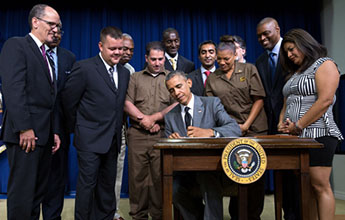 Related Articles
Related Articles

Executive Order Strikes Blow Against
|
 |
| President Obama signs the Fair Pay and Safe Workplaces Executive Order, which requires federal agencies to bar prospective federal contractors that violate labor and safety laws. Photo credit: www.whitehouse.gov |
The Fair Pay and Safe Workplaces Executive Order requires compliance with all wage and hour, health and safety, collective bargaining, family and medical leave and civil rights laws for a contractor to be eligible for any of the $500 billion paid every each year to private companies.
“I praise the president for issuing this executive order. It is long past time a president took action to ensure fair pay and working conditions for federal employees covered by the Service Contract Act,” said the IBEW’s Government Employees Department Director Dennis Phelps.
Wage theft has become a prominent issue in Washington recently and is one of the very few finding political traction in both parties. At the end of July, about the same time as the executive order, the Republican-led Congress approved a Democrat-sponsored amendment to the defense appropriations that would immediately bar contractors that violate federal wage and safety laws. The bill has not been taken up yet in the U.S. Senate.
The most common forms of wage theft include non-payment of overtime, not giving workers their last paycheck after a worker leaves a job, not paying for all the hours worked, not paying minimum wage, and not paying workers at all.
“For Obama’s whole first term, the economic conversation was about debt ceilings and austerity. A bunch of factors, from [the] “Occupy” [movement] to low wage workers rising up across the country, have made the second term very different,” said Change to Win Federation’s Communications Director Paco Fabian. “This executive order is the direct result of individuals taking action together and getting income inequality, not the debt ceiling, on front pages.”
Despite a 2008 law requiring federal contractors stay in compliance with federal law, a study issued by the U.S. Senate’s Health, Education, Labor and Pensions Committee in December found that there was no system to separate the good from the bad.
“Even repeated and serious violations of federal labor laws… do not factor into contracting decisions,” wrote the study’s author, U.S. Senator Tom Harkin of Iowa.
Serial violators of wage laws won contracts worth billions of dollars. Even seven companies that were found responsible for committing Occupational Safety and Health Administration violations that killed up to 42 workers won additional federal contracts.
Hundreds of IBEW members covered by the Service Contract Act will be directly affected by the executive order, but depending on how the order is ultimately translated into federal regulations, all IBEW government employees might feel changes because of the new rule.
For example, Phelps said that thousands of IBEW members work at privately owned shipyards, contracting with the Navy at Huntington-Ingalls in Pascagoula, Miss., Bath Iron Works in Bath, Maine, and Portsmouth Naval Shipyard in Kittery, Maine. They are not covered by the Service Contract Act, but their employers are competing against nonunion shipbuilders like Austal, which has had multiple accusations of unfair labor and unsafe working conditions filed against it.
Because all federal acquisitions are included in the scope of the executive order, Austal could be prevented from doing future work.
“One of the intentions of this order is that upstanding, good actors will take work away from the ones that successfully underbid and then cut corners on safety and wages,” Phelps said. “If Austal is found guilty, and there is reason to expect that may happen soon, that work would shift to more reputable contractors like Ingalls and Newport News, which are both union organized.”
The executive order will now go through a multiyear drafting process overseen by the Federal Acquisition Regulatory Council that Phelps expects will take until 2016.
“We will push for the strongest possible rules so that only companies that do right by workers and taxpayers see money from the federal government,” Phelps said.
By the Numbers: Wage Theft
1 in 5 - American workers works for a company that does business with the federal government (source: U.S. Senate Health, Education, Labor and Pensions Committee)
1 in 5 - Federal contractors failed to pay overtime and 1 in 10 forced their employees to work off the clock (source: National Employment Law Project)
1 in 3 - Of the largest penalties handed down for violating federal labor laws from 2007-2013 were given to federal contractors (source: U.S. Senate Health, Education, Labor and Pensions Committee)
35% - Of the 100 largest federal contractors violated both wage AND worker safety laws between 2007 and 2012. (source: U.S. Senate Health, Education, Labor and Pensions Committee)
$2,634 - Average amount lost by low wage workers due to wage theft, nearly 20 percent of their annual income (source: Economic Policy Institute)
Related news:
President Overturns Bush Ban on Federal PLAs
![]()